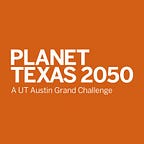UT Researchers Hunt for COVID-19 in Human Waste
By Mary Huber
Our dirty, smelly wastewater could hold something very valuable: the key to tracking COVID-19 hot spots in Austin before diagnostic testing is able to identify outbreaks.
The novel coronavirus is a fecally shed virus, which means its signature shows up in our waste. Because of this, University of Texas researchers are hoping they can track its spread by studying human feces.
Mary Jo Kirisits, an associate professor in UT’s Department of Civil, Architectural and Environmental Engineering, is leading a team that’s monitoring COVID-19 in Austin’s wastewater to identify upticks in cases before people show up with symptoms at clinics.
The team includes professor Kerry Kinney, researcher JP Maestre and graduate students Emma Palmer and David Jarma, also from the Cockrell School of Engineering, as well as research scientist Suzanne Pierce, analyst Lissa Pearson and engineering scientist Anna Dabrowski from the Texas Advanced Computing Center (TACC).
They have been taking samples from man holes on the UT campus to see if they can detect spikes in COVID-19 and trace them back to particular locations.
The project is known as Canary, named for the small birds that served as an early warning system to coal miners in the early 1900s. The birds were taken into tunnels to detect carbon monoxide and other toxic gases before they could hurt humans.
Many of the team members were already connected through the university’s Bridging Barriers grand challenge program, which brings together researchers from across disciplines to solve major societal problems. They often rely on data and information running in the background of our lives, such as — in this instance — wastewater.
The researchers were all focused on other projects when the pandemic began to worsen in the United States, and they knew immediately they wanted to shift gears to use their individual expertise to help.
“Everyone working on this is volunteering,” Kinney says. “It’s smelly but valuable work.”
Read more about the team and their stinky but insightful project.
Please join us on this journey.
Planet Texas 2050 is a research grand challenge at The University of Texas at Austin. We’re a team of more than 150 researchers across all disciplines working together over the next decade to find ways to make our state more resilient in the face of extreme weather events and rapid population growth. Follow us on Twitter, visit our website, and come back to our blog for updates.
Mary Jo Kirisits, Ph.D., is an associate professor in UT’s Department of Civil, Architectural and Environmental Engineering and Planet Texas 2050 researcher. Her research focuses on biological water treatment processes and application of molecular biology to biological water treatment processes.
